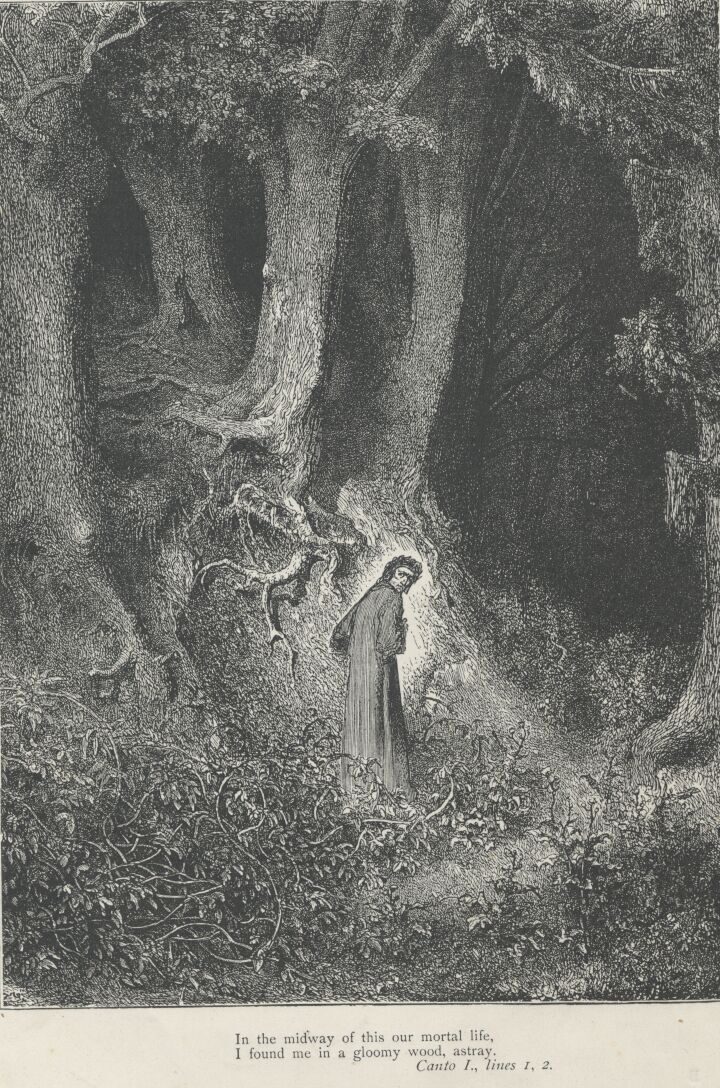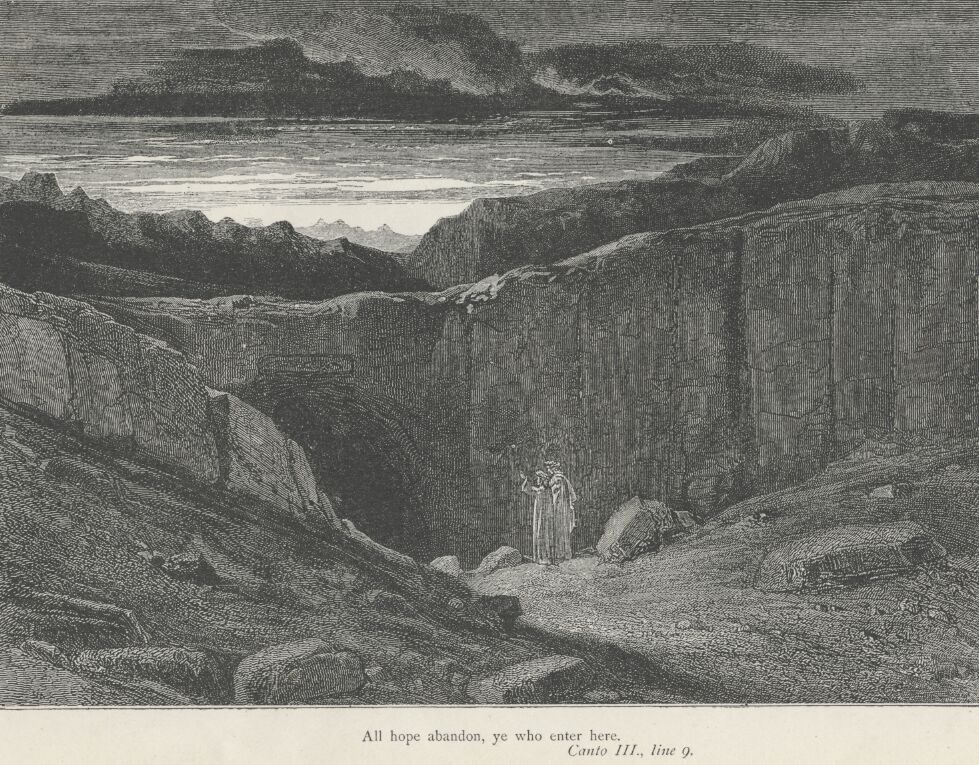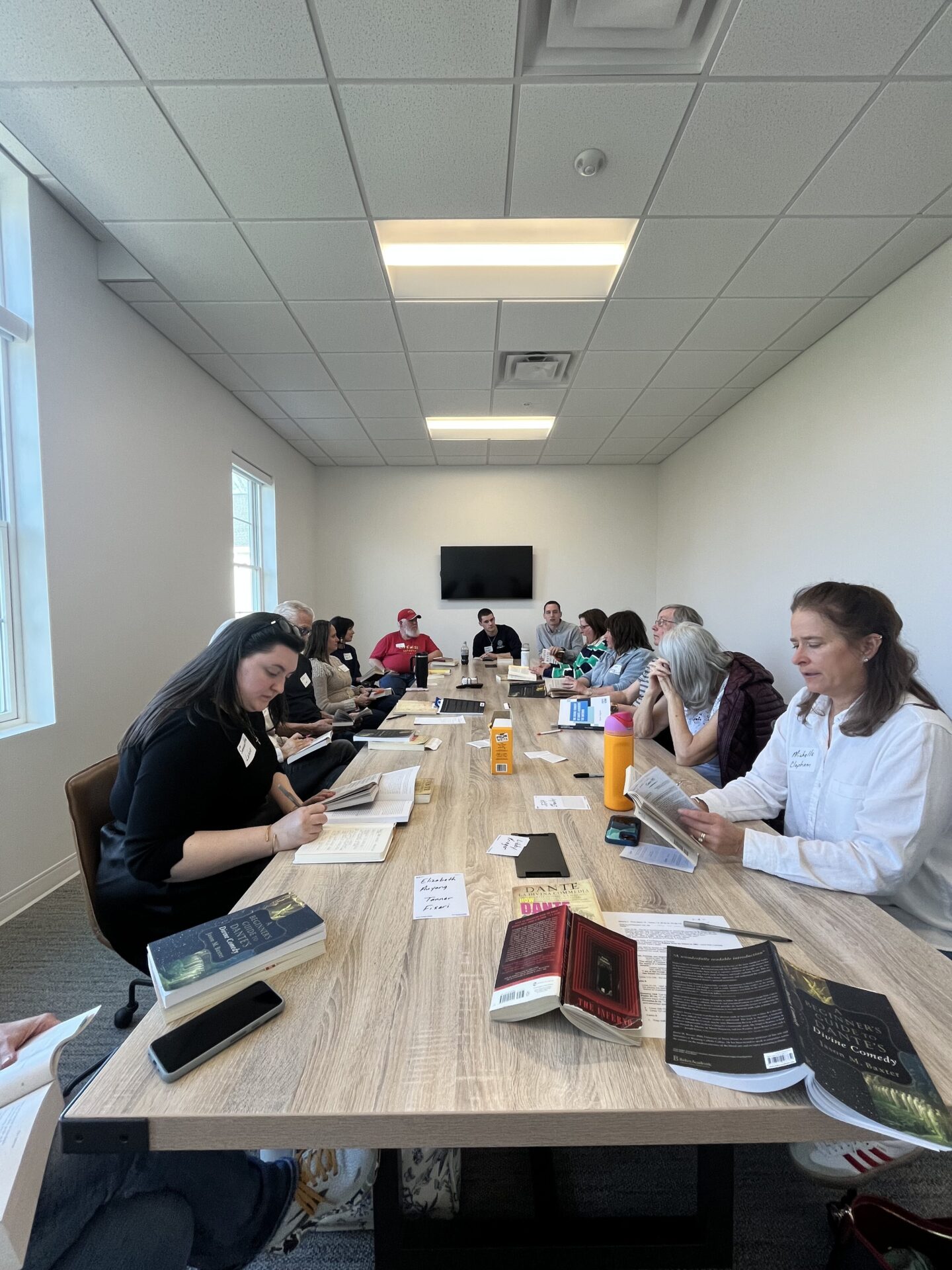
He awakens in a dark forest, no idea how he got there. He sees a clearing up a hill where the sun has broken through. Anxious, alone, bewildered, he sets off for the clearing. Just as he begins to make progress, three vicious predators – a wolf, a lion and a leopard – threaten to tear him limb from limb if he continues his path upward to the light. Retreating back into the tangled thicket of woods, Dante sinks to the ground, despairing of ever escaping the vast waste of a forest he has somehow gotten lost in. Suddenly, out of nowhere, someone approaches.
He cries out: “Have pity on me, whatever thing you are; whether shade (spirit) or living man!”
Thus begins what some consider the single most important and imaginative work the West has ever produced. The opening metaphor – finding yourself lost in a dark wood with no idea how you arrived and how to get out – is powerful. Have you ever gotten yourself into a mess that you can’t get out of, that you have no idea how you got yourself into? Have you ever experienced the shock of hearing someone else’s sudden, biting criticisms about your character or behavior, which you previously were blind to? Have you ever been betrayed by someone you loved deeply, but who has, as it turns out, been treacherous? Have you ever had the diagnosis you never thought you’d have, and it turned your life completely upside down? Most of us have. If you haven’t, I hate to break it to you – you will (I’m not a prophet, nor the son of a prophet, but life does this to all of us eventually). When it happens, it is utterly disorienting, a bit like waking up in the middle of the woods without knowing where to go.
Dante learns from his guide Virgil that he must go down before he goes up. Virgil has been sent from above to help him get out of the mess he is in, to ultimately find God and glory and truth and love. But before all the good stuff, he has to go through Hell. Literally. This too is wisdom. When we find ourselves disoriented and despairing, lost in the woods, it usually gets worse before it gets better. When we are confronted with our own moral flaws, or a sudden illness we never anticipated, or when we get cut from the team we desperately wanted to make, or get fired from the job we thought we were doing just fine in, or the one we thought would never betray us leaves, we are usually required by life to deal with the failure or problem or tragedy, through darkness and despair, before we can come out on the other side having learned and grown and been sanctified.

This is Dante’s journey, guided by his poet protector, the Roman legend, Virgil. I had been meaning to read the Inferno for a few years. My daughter beat me to it, having studied it in her humanities class. I didn’t feel right being less literate than Annie, which provided motivation. But it wasn’t until I decided to put an invitation out there to several people at NAPC who had let me know they wanted to be part of a reading group that I finally had the accountability to actually read it. This year, we meet once a month to discuss a few Cantos at a time. I didn’t have my act together in time to announce it to the whole church before the end of 2024. If you are interested in joining this group, we have only met three times and welcome newcomers. Reach out here and we will give you the details.
The Commedia (as all three parts of the poem are called together – Inferno, Purgatorio, Paradaiso) is a marvel of poetic architecture – after the introductory “canto” (Italian for song, but here it means a section of the poem), there are 33 each for each of the three parts, totaling 100. Dante uses a rhyming scheme called terza rima – each stanza contains three lines, the first and third line rhyming, the middle line introducing a new ending that in the following stanza will be reused in the first and third lines, and so on throughout the poem. This is mathematical precision and beauty that defies the imagination in terms of writing. The number three, used so much throughout the poem, is a clear Trinitarian reference.
You might think this would lead to a formulaic, restrictive and rigid work. You would be wrong. Dante has been called the “poet of disgust,” because of the lurid descriptions he uses to describe the damned and the punishments they suffer. In the 8th circle, for example, are the Flatterers (what do we call a guy who disingenuously flatters everyone? “He’s an #&$-kisser.” “He’s full of &*$^.”). They are punished by being stuck in a river of feces for all eternity. Why? Their words in mortal life were a metaphorical waste, and now they exist for all eternity is literal waste. The diviners and fortune tellers, who attempted to know the future by demonic means, are in another corner of the 8th circle, with their heads affixed in the opposite direction. They are unable to face forward since they so sinfully attempted to gain sight into what was coming. Their eyes are filled with tears of sorrow, further distorting their vision. This kind of creative punishment, called contrapasso, (“to suffer the opposite”) is pervasive throughout the poem (not to mention, at times, the Bible, as in Genesis 6:1-3). The arresting images he uses are meant to grab our attention. Dante believed that engaging our senses – the sights, smells, and sounds of Hell – would be the only way to fix our attention on what is happening in the story, and the most potent way to penetrate the reader’s armor so that we would meditate on and repent of our own sins.
One last provocative idea from Dante – sinful pity. Throughout the poem at several stages, Dante sees the souls who are damned to hell for their various evils done – betrayal, adultery, gluttony, sullenness, violent wrath – and his response is to weep. He sees their suffering, and feels for them. What a normal thing to feel, when someone is suffering! Yet Virgil, his guide, rebukes him for his pity.
Reader, so may God grant you to understand
my poem and profit from it, ask yourself
how could I check my tears, when near at hand
I saw the image of our humanity
distorted so that the tears that burst from their eyes
ran down the cleft of their buttocks. Certainly
I wept. I leaned against the jagged face
of a rock and wept so that my Guide said: “Still?
Still like the other fools? There is no place
for pity here. Who is more arrogant
within his soul, who is more impious
than one who dares to sorrow at God’s judgment?
(Canto 20, lines 19-30)
What is going on here? Simply this: to pity the damned is to be sorry about God’s perfect, righteous judgment. This is to put oneself above God, rather than trusting in God as the perfect judge. Now, to be clear, while we have life, we should have no lack of pity for the lost and the sinful. We who follow Jesus are ourselves sinful, and through no merit of our own we have been redeemed by His blood. Jesus pitied us when we were sinners (Romans 5:8). No matter who, no matter what, we long for the lost to be found, the dead to be made alive, the blind to be given sight. No one is beyond the pale of God’s mercy in this life, no matter what they have done, if they are willing to humbly repent and trust in Christ.
No one is beyond the pale of God’s mercy in this life, no matter what they have done, if they are willing to humbly repent and trust in Christ.
But there is, I think, a corollary for us, in this life, related to this recurrent theme in the Inferno. Just as Dante inadvertently dared to sorrow (and therefore question) God’s judgment, we too can be tempted at times to be more compassionate than God. This happens when we so identify with someone practicing sinful behavior, someone who wants to be affirmed in that behavior, that we side with our friend or family member who is sinning instead of the God who defines sin. No one can be more compassionate than God. If we find ourselves in the attempt, best to shut it down immediately. God’s Word is the benchmark for righteousness, sinfulness, compassion, mercy, and pity. There is such a thing as sinful empathy. Dante was guilty of it in the Inferno, and we can be as well.
If you skimmed this and missed it above: join our Dante reading group by clicking here. It has been an interesting and edifying few meetings together as we have been traveling through Hell.
Pastor David


